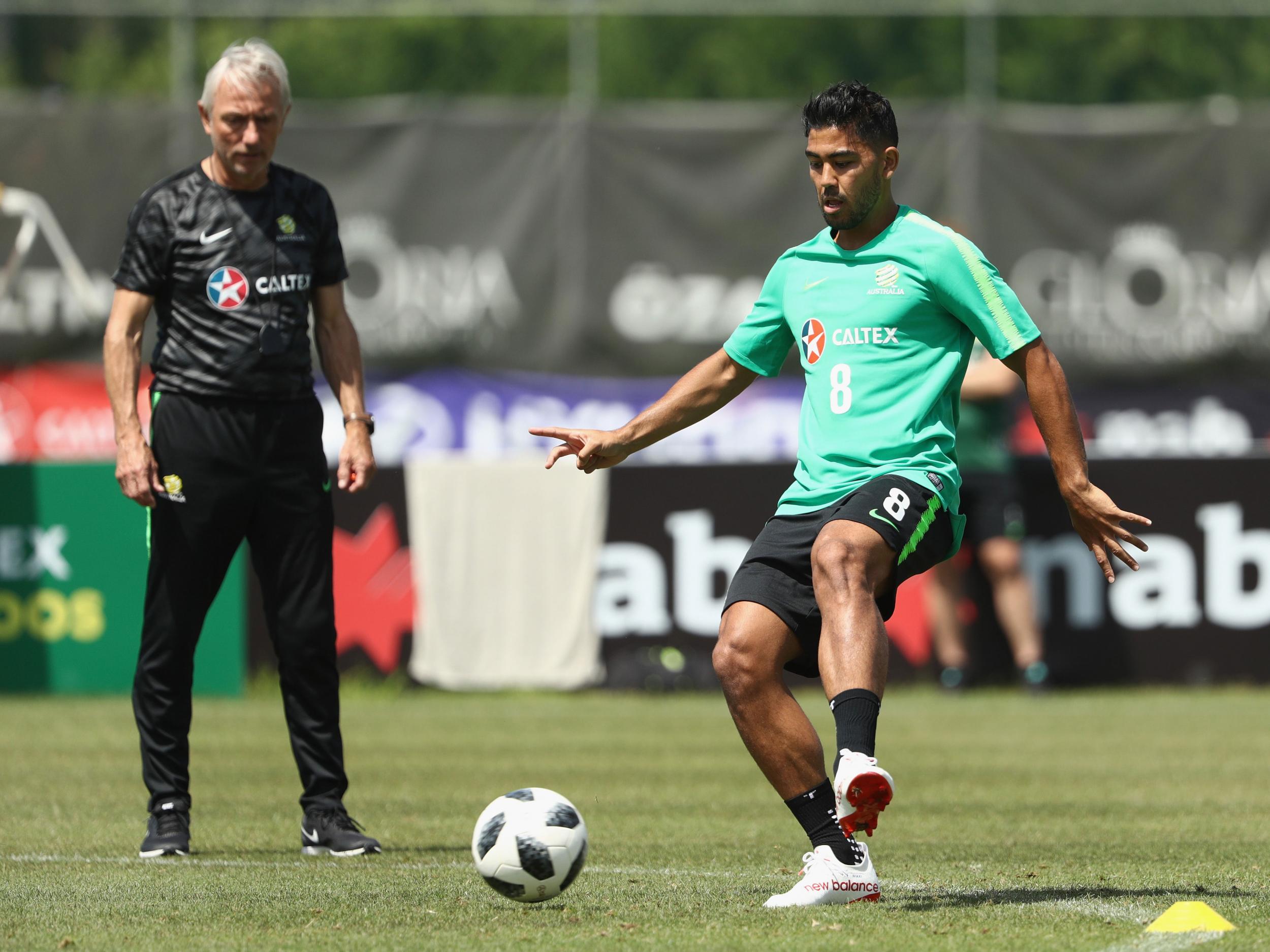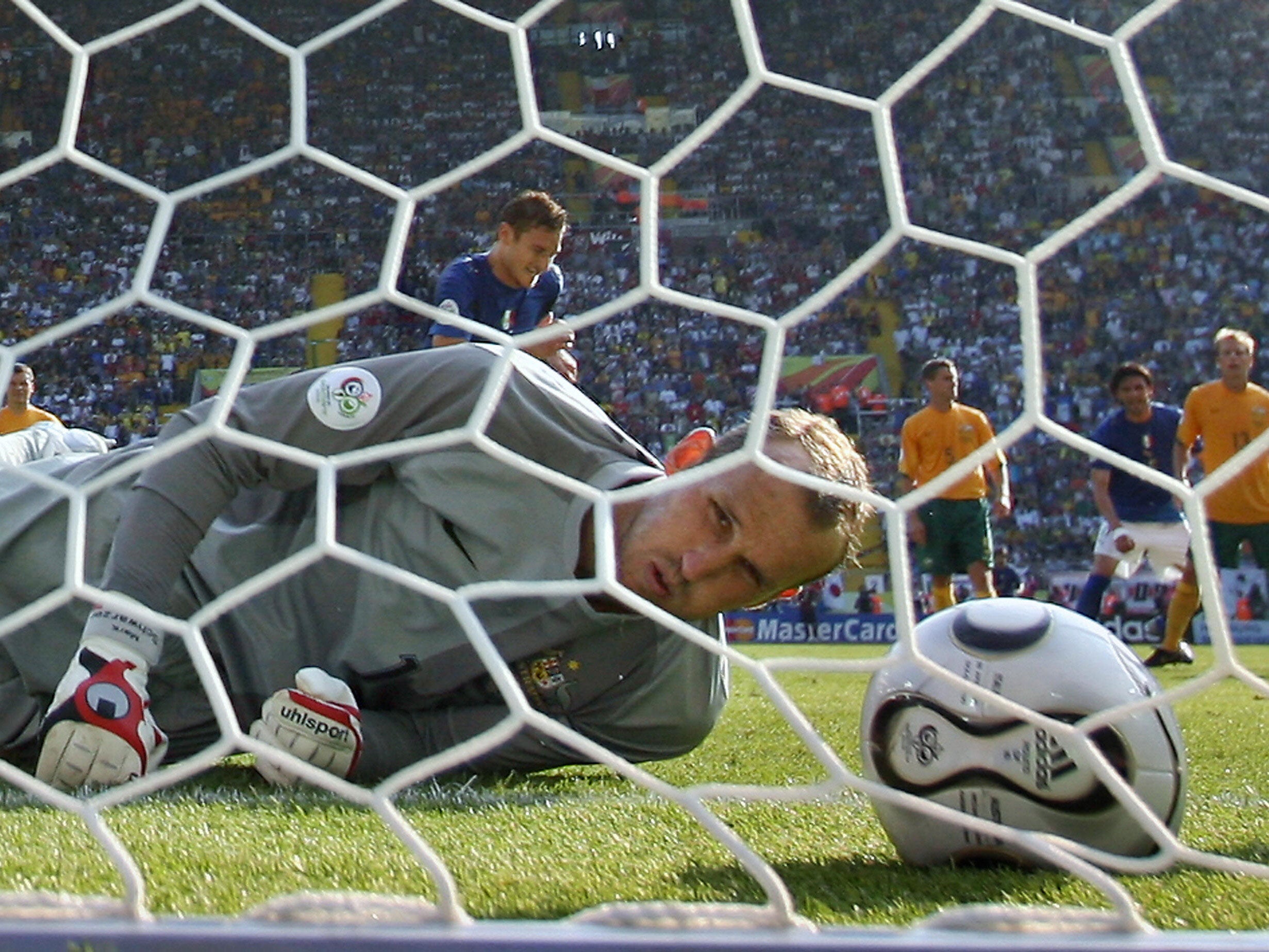Massimo Luongo: Australia wants us to 'get the good name back' at World Cup
Exclusive interview: After a tumultuous year so far in Australian sport, the Queens Park Rangers midfielder explains why the country's soccer team can provide redemption in Russia
When Australia play France in Kazan on Saturday – and when they play Denmark and Peru too – they are playing for far more than just three points and a shot at the last 16.
They are playing for national pride. Public trust. The global reputation of Australian sport.
Half-way through 2018, this is something that needs to be rebuilt. When Cameron Bancroft eroded the surface of a cricket ball with a piece of sandpaper in Cape Town on 24 March, he also eroded one of the pillars of the Australian ethos and national self-definition: playing fair. That is why captain Steve Smith and vice-captain David Warner have been banned from the team for a year and Bancroft for nine months, and why coach Darren Lehmann lost his job too.
That puts a responsibility on the football team this summer, and it also creates an opening. Bert van Marwijk’s side have to play fair, to stay on the right side of the line, to rebuild that reputation at home and abroad. But doing so gives this team a rare chance to win the hearts of the Australian public, for whom soccer lags far behind AFL and rugby league most of the time.
Big stakes, but Massimo Luongo is relishing it. Speaking to The Independent at the Queens Park Rangers training ground at the end of another impressive Championship season, Luongo wants to show the world that Australian sport is still true to the ethos it claims for itself.
“Not just Australian people, but the way people look at Australian sport,” Luongo says. “Everyone is joking when they see me, ‘you’re a bunch of cheats’. I think if we do something special in the World Cup, it automatically erases that. Big news, new news, always puts other [stories] in the shadow.”
Luongo brings up the case of Nick Kyrgios, the brilliant Australian tennis player who has been scorned for unashamedly giving up matches he felt he was going to lose. That was an affront to Australian sporting values too.
“That’s why it’s such big news,” Luongo says. “We had the Kyrgios situation when he left the game go, it was everywhere. The culture of Australians with sport has always been to play fair. We’ve always been a sporting culture where we just give it our all. When that happened, the cricket thing, everyone was saying ‘it’s not the Australian way’. That’s why it got blown up so much.”
This is where the football team comes in. “We are naturally a side that carries the name ‘Australia’ in a good way,” Luongo says. “The Australian public will be following us a bit more now, just to get the good name back.”
But then the Australian soccer team has always had to fight hard for attention and space in one of the sportiest countries on earth. Aussie rules football (AFL) and rugby league (NRL) dominate the landscape, and the challenge for soccer is to convert wide enthusiasm for the game itself into a deep national passion for the professional side. But when better to do that than in a World Cup?
“It’s difficult,” Luongo sighs. “Soccer is the most participated sport in Australia. By far. But I’d say where we’ve got to work on is our crowds. Obviously they’re not as big as AFL. We have games where they, are but consistently, it’s AFL, cricket, and rugby league on the east coast is massive. In those terms, we’ve got a long way to go. I think it’s just embedded in Australian sport culture.”
The fact is that football is not a deeply-rooted Australian sport like the others. And the choice to specialise in it and pursue a professional career – as Luongo did as a teenager – is often made by those with a recent family connection to Europe.

“AFL is just part of Australia,” Luongo says. “Whereas football is like a foreign sport, as they say. And growing up, choosing soccer over rugby, over cricket, it wasn’t a popular choice. It was a sort of an outcast thing to do in school to go and play soccer. And a lot of the boys that chose soccer were children of immigrants or people that had come over.”
That was Luongo’s own story. His father Mario is Italian and pushed Massimo from childhood into becoming a footballer. He would play football in the park, basketball and cricket at school and his friends were all rugby league fans. He is too, and while his local side is the Sydney Roosters, his own team is the Parramatta Eels. But football was his passion, not least because he grew up watching Juventus on TV.
It was the televised power of the 2006 World Cup, though, that made the biggest impact on a 13-year-old Luongo and his generation of Australians. It was Australia’s second ever World Cup – the first was in 1974 – and its power cannot be overestimated. An Australian team full of Premier League quality, managed by Guus Hiddink, got out of a difficult group, beating Japan, drawing with Croatia, only to lose bravely to a last-kick Francesco Totti penalty in the last-16.
That Australian team won over a new generation to the game, while also setting a standard for those youngsters to aspire to. “They called that squad the ‘Golden Generation’, big players playing in big leagues week-in week-out,” Luongo said. “That’s what I remember, the standard of players back then. Not saying they’re better or worse than us, but they left a mark in Australian football history.”
Now it is the moment for Luongo and his team to do the same. They may not have the experience and quality of the Mark Schwarzer, Harry Kewell, Mark Viduka side but Luongo wants to aim just as high.
“In the World Cup, we do [have big shoes to fill], because they did so well in 2006,” Luongo says. “But overall, as a football nation, I think we’ve come a long way since then. The football we’ve been playing, we won the 2015 Asian Cup, with the help of our old manager [Ange Postecoglu]. We’ve taken football in Australia to a different level, even grass-roots football. I think we’ve still got a long way to fill their shoes, but this is a great chance to do it.”

Postecoglu coached the Australian team for four years, largely succeeding in encouraging a more footballing style from the players. “We’re a team that works hard for each other and covers each other’s backs, and in the past four years we have been working to get away from that, to be known as a more footballing nation,” Luongo says. “Which is difficult, but we’ve come a long way.”
After qualification was confirmed, Postecoglu stepped down and he has been replaced by Bert van Marwijk, the man who took the Netherlands to the World Cup final in 2010. His elite experience is already proving useful: Australia got a good draw with Colombia at Craven Cottage in March, and thumped Czech Republic 4-0 in Austria on 1 June.
“You can tell [Van Marwijk] has got a lot of experience, he’s been at it for a long time,” Luongo says. “He wants us to be more focused in our defensive shape, he wants us to be solid and play in a way where no matter who we play, we can do a job against them.”
That is what Australia will have to do when they kick off against France on 16 June. “It fees like it’s do-or-die in the first game,” Luongo admits. “Then, hopefully, if we get a result against France, anything can happen. Our goal is to get out of the group. I think that’s achievable, especially with the last four years under our belts. I think we’ve got enough to get over the line.”
Australia did not get out of the group stage in 2010 or 2014. Going one better this year would put this team on a level with the 2006 side. But it would also serve bigger purposes. Reminding the world what Australian sport is all about. Giving Australians a good-news story in a year that needs it. And inspiring the next generation of teenagers to take up the sport and raise the bar in the future.
“The sport relies on the national team to promote it,” Luongo says. “When I was picking soccer in school, the success of the 2006 World Cup happened. Football grew massively in just that short amount of time. 12 years later, it’s massive now. Probably still not at the top, but it has come so far.”
“And we’ve got the womens’ team doing really well, doing so much for the country. I didn’t realise until I was in the set-up, there’s a lot going for playing for your national team rather than just the honour of representing your country. You’ve got that responsibility of representing football all over Australia.”
Join our commenting forum
Join thought-provoking conversations, follow other Independent readers and see their replies
Comments
Bookmark popover
Removed from bookmarks